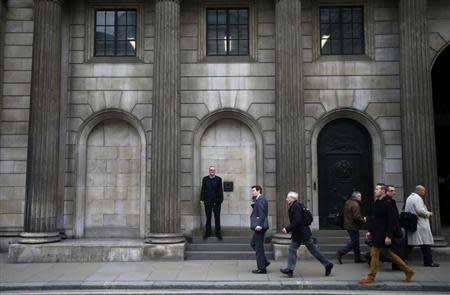World equities fall on valuation fears, bonds gain
By Herbert Lash NEW YORK (Reuters) - Global equity markets fell on Friday as fears on Wall Street about over-stretched stock valuations spread to Asia and Europe, pushing investors to the safety of bonds. The Nasdaq composite, which has been pounded in recent days as investors bailed out of high-flying technology and biotech shares, slipped anew. The index on Thursday had recorded its biggest single-day percentage loss since November 2011. The benchmark S&P 500 index was also lower after failing to hold a brief rebound, and was on target for its worst week since January. The Nasdaq biotech index <.NBI>, down more than 20 percent from late February, also tried to recover, but slid another 0.6 percent. Benchmark 10-year Treasuries notes tracked the ups and downs on Wall Street, paring gains early in the session, then rising in choppy trade. With equities lower, the 10-year bond rose 2/32 in price to yield 2.6211 percent. "This equity market meltdown has brought a 'fear' bid into bonds," said Larry Milstein, head of government and agency trading at R.W. Pressprich & Co in New York. A benchmark of global equities fell to a two-week low, spurred by a broad risk-averse tenor among investors that led to selloffs in higher-yielding currencies and emerging market assets. "There's been contagion from the correction in the U.S. which is probably not over. But the fact is, this is mostly a U.S. correction," said David Thebault, head of quantitative sales trading at Global Equities in Paris. "People are getting out of overvalued sectors and looking for bargains elsewhere. The market's positive longer-term trend is still intact, this pullback will just remove the froth," he said. The slide in global equities persisted in the wake of disappointing quarterly results from JPMorgan Chase & Co , the biggest U.S. bank. This exerted more pressure on the benchmark Standard & Poor's 500 index <.SPX>, which on Thursday had suffered its biggest one-day drop in two months. Shares of JPMorgan sank 3.2 percent to $55.59, while the S&P financial index <.SPSY> lost 0.8 percent and was the worst performing S&P sector. MSCI's all-country world equity index <.MIWD00000PUS> fell to lows last seen in late March and was last trading down 0.8 percent. European technology stocks <.SX8P> led sectoral falls with a 2.5 percent decline, echoing U.S. declines. The tech sector in Europe had rallied more than 40 percent since November 2012 through the start of April. ARM , whose chip designs are featured in smartphones such as Apple's iPhones, fell 4.5 percent. The pan-European FTSEurofirst 300 <.FTEU3> of leading regional shares closed down 1.4 percent at 1,312.92. The Dow Jones industrial average <.DJI> fell 113.9 points, or 0.7 percent, to 16,056.32. The S&P 500 <.SPX> lost 9.79 points, or 0.53 percent, to 1,823.29 and the Nasdaq Composite <.IXIC> dropped 26.411 points, or 0.65 percent, to 4,027.695. The dollar index, which measures the greenback against six major currencies, rose 0.06 percent, and the dollar edged higher against the yen, up 0.07 percent. The euro rose slightly against the dollar. "Bad news for the world is good news for the dollar," said Steven Englander, managing director and global head of G10 FX strategy at CitiFX in New York. "Once fears about the equity market intensified, they picked up a more conventional type of mode to buy the dollar." Brent oil futures gained slightly. Brent crude was up 25 cents at $107.71 a barrel. U.S. oil was up 71 cents at $104.11 a barrel. (Reporting by Herbert Lash; Additional reporting by Atul Prakash in London; Editing by Leslie Adler and Nick Zieminski)


